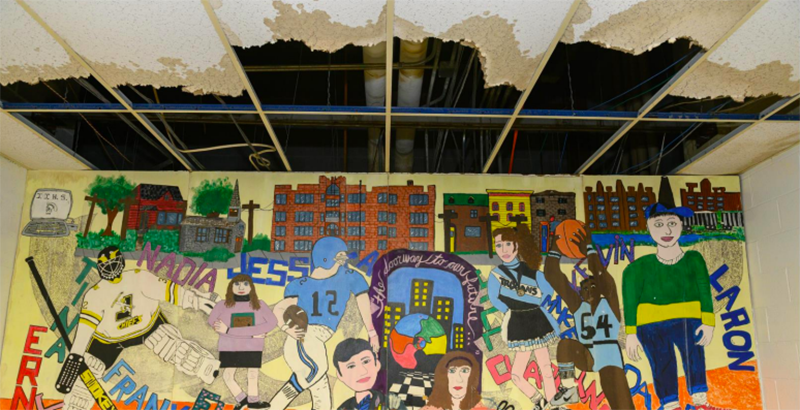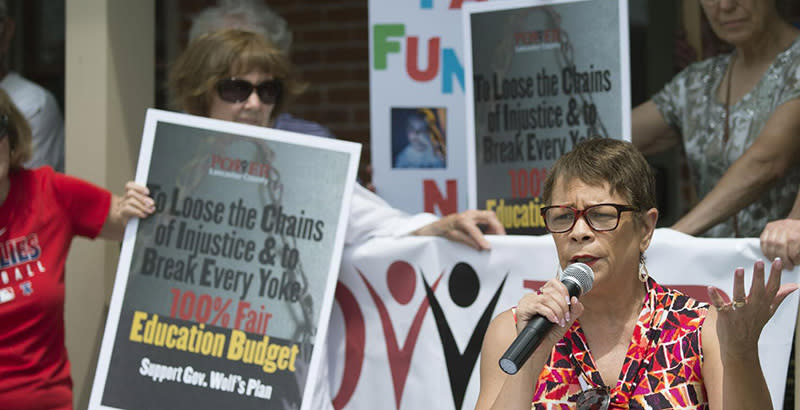‘An Earthquake’: Judge Rules PA School Funding Unconstitutional, Must Be Changed

- Oops!Something went wrong.Please try again later.
Updated
A Pennsylvania judge on Tuesday ruled the state’s school funding formula unconstitutional, noting it leaves poor districts unable to afford the teachers, counselors, curriculum and building repairs necessary to meet students’ needs — and keep them safe.
After an eight-year legal battle, Judge Renée Cohn Jubelirer’s decision came down resoundingly on the side of the families, school districts and advocates who sued for more money. She found the stark disparities in outcomes between students in high- and low-wealth districts were directly related to the vast difference in resources made available to them by a state funding formula reliant on local property taxes.
Jubelirer said it is now up to the state to craft a more equitable system for its 1.73 million schoolchildren. Her ruling did not come with a timetable — though it did advise all relevant parties to do so at “the first opportunity” — nor a specific payment amount. Although Pennsylvania has since directed more money to its public schools, the plaintiffs had alleged districts were being underfunded by $4.6 billion a year.
Get stories like these delivered straight to your inbox. Sign up for The 74 Newsletter
“All witnesses agree that every child can learn,” the judge concluded at the end of her 786-page decision. “It is now the obligation of the Legislature, Executive Branch, and educators, to make the constitutional promise a reality in this Commonwealth.”
Dan Urevick-Ackelsberg, a senior attorney with the Public Interest Law Center who represented the school districts, said the judge’s ruling marked an extraordinary moment.
“This is an earthquake that will reverberate for the children of Pennsylvania for a long, long, long time,” he said.
Maura McInerney, legal director of the Education Law Center, another of the firms challenging the funding formula, called the ruling a clear and unequivocal victory for public school children across Pennsylvania.
“The court ruled the right to an education is a fundamental right,” she said, adding it “found that nothing justifies the gross disparities between low-wealth and high-wealth school districts that we see across our state. We are excited and really enthusiastic about what will happen for the trajectory of the lives of schoolchildren in Pennsylvania.”
It’s unclear whether the decision will be appealed to the state Supreme Court. Patrick Northen, John Krill and Anthony Holtzman, three of the defendants’ attorneys, could not be reached for comment Wednesday. During the trial, they argued state lawmakers had met their constitutional obligations to provide an “adequate education” and questioned whether the plaintiff districts had directed their resources to meet the most serious student needs.
Pennsylvania’s school funding formula has long been considered among the nation’s most inequitable, with 38% coming from the state and 43% from local property taxes. That ratio ranks the Commonwealth 45th nationally, according to the National Center for Education Statistics.
Related: Landmark PA School Funding Case May Spur — or Chill — Similar Suits Nationwide
Jubelirer ruled local control — the notion that local communities decide on their own how much of their resources to devote to public education — was no excuse for the types of inequities described during the 49-day trial.
The court proceedings involved dozens of witnesses — many from the six school districts that filed the lawsuit back in November 2014 — along with 1,700 exhibits that proved, in her opinion, poor districts were unable to meet students’ needs.

Many students do not qualify for college-level Advanced Placement courses in high school because of an achievement gap that began in their elementary years that could not be corrected, administrators testified.
A lack of space at one of William Penn’s elementary schools means art and music is taught in the basement in a room that has an opening to a sump pump.
Makeshift classrooms have been set up inside hallways, closets and basements throughout these school systems. Many buildings are plagued by roaches, rodents, leaky roofs, lead paint, mold and asbestos. Some lack heat, air conditioning and potable water.
“It is evident to the Court that the current system of funding public education has disproportionately, negatively impacted students who attend schools in low-wealth school districts,” Jubelirer wrote. “This disparity is the result of a funding system that is heavily dependent on local tax revenue, which benefits students in high-wealth districts.”
The evidence, she said, supported “the inescapable conclusion that these students are not receiving a meaningful opportunity to succeed,” adding that consistent achievement gaps for economically disadvantaged students was tantamount to a violation of the state Constitution’s equal protection clause.
She said, too, that the funding formula “does not adequately take into account student needs, which are generally higher in low-wealth districts.”
Jubelirer said the opposing side has not proven local control would be undermined by a more equitable funding system.
“Local control could be promoted by providing low-wealth districts with real choice, instead of choices dictated by their lack of needed funds,” she wrote.
The defendants told the court the state requires only a minimal basic education without regard to outcomes for students, which are influenced by several factors well beyond schools’ reach. They said, too, that the Commonwealth needs low-skill, low-wage labor.
“I think there is a need for retail workers, people who know how to flip pizza crust,” said Krill, the lawyer defending then-Assembly Speaker Jake Corman, during the trial. “My point is, do these proficiency standards actually in any way imaginable serve the needs of the Commonwealth such as they should be mandatory across the board? I think the answer is no.”
Newly elected Democratic Gov. Josh Shapiro filed an amicus brief in May 2022 in support of the lawsuit back when he served as the state’s attorney general, writing that the defendants in the case wanted the court only to determine whether Pennsylvania’s education system provides students with the “opportunity” to obtain a constitutionally sufficient education.
“But they ask the Court to read too little into the word ‘opportunity,’” he wrote. “The opportunity… is meaningless if the public education system cannot actually provide a thorough and efficient education to all students, regardless of socioeconomic background.”
Shapiro, in a statement released Wednesday, seemed to support his initial argument.
“Creating real opportunity for our children begins in our schools, and I believe every child in Pennsylvania should have access to a high-quality education and safe learning environment, regardless of their zip code,” he said. “My Administration is in the process of reviewing the Commonwealth Court’s opinion and we are determining next steps.”
Acting Attorney General Michelle Henry said her office is still in the process of thoroughly reviewing the lengthy opinion, “but we were gratified to learn today that the Court agreed with our position, paving the way for Pennsylvania lawmakers to come together to create a new system that works for all children and families.”

The case was filed by the William Penn, Panther Valley, Greater Johnstown, Wilkes-Barre Area and Shenandoah Valley school districts alongside the School District of Lancaster. It names parents, children, the NAACP and the Pennsylvania Association of Rural and Small Schools among the petitioners.
The current lists of defendants, which has changed since the case was first filed, includes Gov. Shapiro, Secretary of Education Khalid N. Mumin, Senate President pro tempore Kim Ward and House Speaker Mark Rozzi. During the trial, the governor’s office and the state education department did not fight to counter the plaintiffs’ claims while the state legislative leaders did.
The Commonwealth Court initially dismissed the case, siding with the defendants by ruling school funding decisions are the responsibility of the legislature, not the judicial branch. The plaintiffs appealed to the state Supreme Court, which sent the case back to the Commonwealth Court in 2017 for trial.
Urevick-Ackelsberg said the state’s obligation to fix the system starts now, even if the case is again appealed to the state Supreme Court. “We are going to assume the General Assembly is going to follow the law. We will be back in court to enforce whatever we need to to make sure they do so.”
The attorney said he believes the issue will be addressed relatively quickly. School funding cases are notoriously known to drag on for years, even after those challenging the formulas prevail in court.
“Do we expect this to take years and years? No,” he said. “If there is an appeal, we will do everything in our power to make sure the ruling is not stayed … and we get to work right away.”

